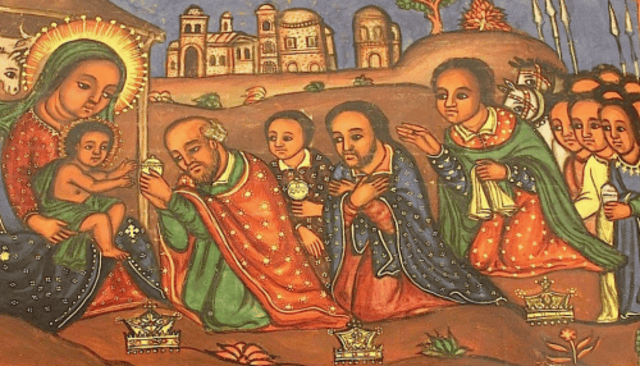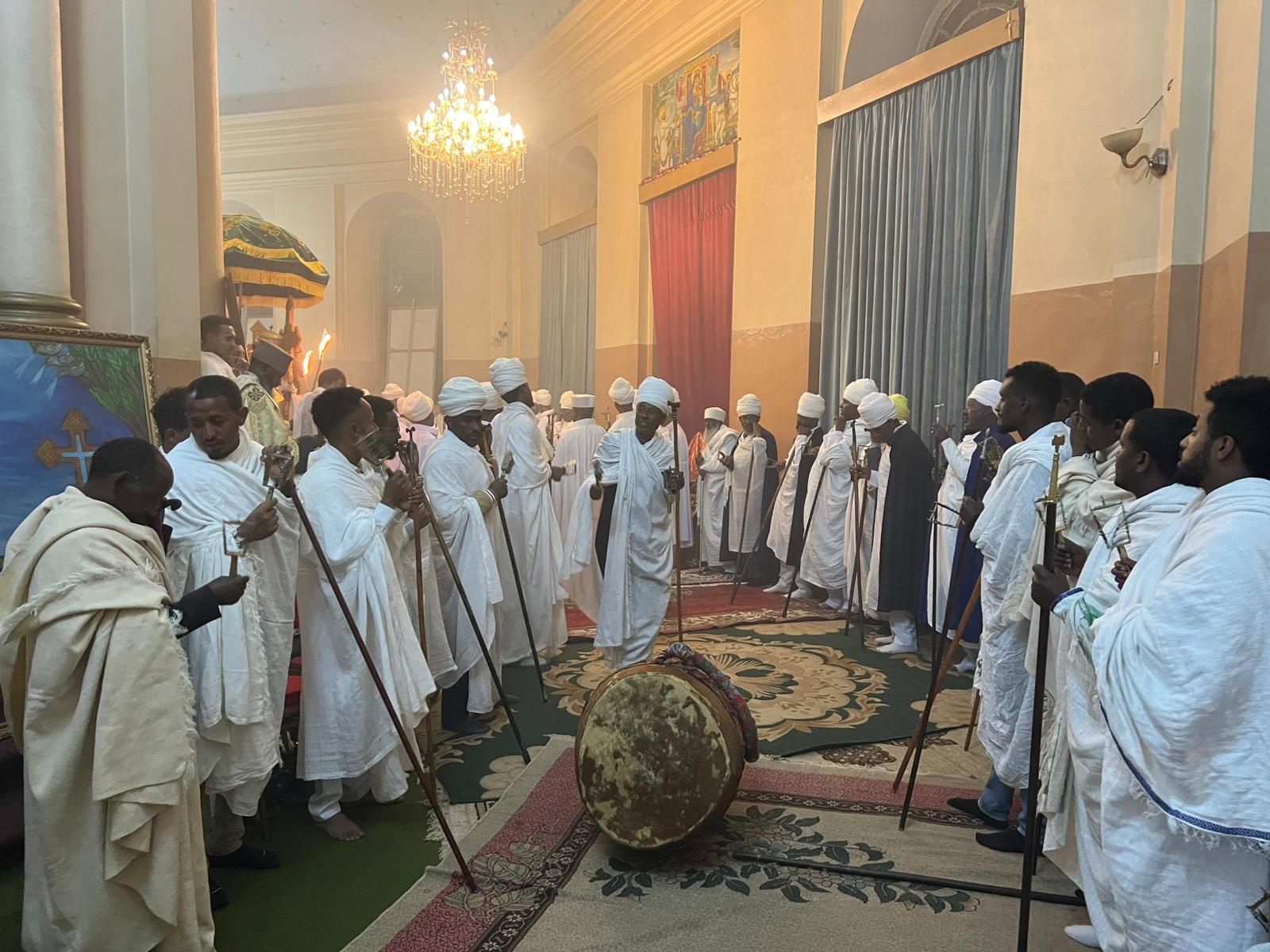 Image credit: Three Wise Men or Magi, as described in The Gospel according to St. Matthew (British Library Or. 607, f.14v). From one of the manuscripts looted by the British Expedition to Ethiopia of 1868.
Image credit: Three Wise Men or Magi, as described in The Gospel according to St. Matthew (British Library Or. 607, f.14v). From one of the manuscripts looted by the British Expedition to Ethiopia of 1868.
Tadias Magazine
Publisher’s Note:
As we celebrate Genna (Ethiopian Christmas) today, this exclusive article by Elias Wondimu, founding director of TSEHAI Publishers, serves as a timely and vital reflection. With remarkable clarity and depth, Elias dismantles misrepresentations of Ethiopia’s Christian legacy while highlighting the nation’s pivotal role in shaping the spiritual and cultural meaning of Christmas for centuries. His perspective invites us to move beyond reductive narratives, offering instead a richer understanding of Ethiopia’s enduring contributions to the global Christian story.”
By Elias Wondimu

Updated: January 6th, 2025
Ethiopia Knows It’s Christmas: Genna, a Timeless Legacy Misrepresented
Addis Ababa (TADIAS) — Today, as Ethiopians worldwide gather to celebrate Genna (Christmas), just 118 days after the 2017 Ethiopian New Year, the festivities are more than a joyful occasion—they are a profound affirmation of truth. Ethiopia not only knows it’s Christmas but has shaped its meaning for centuries, serving as a cornerstone of Christian heritage and spiritual devotion.
For four decades, however, the song “Do They Know It’s Christmas?”, celebrated as a humanitarian anthem, has perpetuated a misrepresentation of Ethiopia’s spiritual legacy. In 1984, as Ethiopia endured a devastating famine, it welcomed international food aid with heartfelt gratitude. Yet, alongside that aid came a song that inflicted wounds deeper than hunger. Bob Geldof’s “Do They Know It’s Christmas?” reduced a nation with millennia of Christian tradition, cultural richness, and resilience to a simplistic image of helplessness. Its patronizing refrain—“Do they know it’s Christmas time at all?”—was not only misinformed but dismissive of Ethiopia’s central role in the Christian story. While millions rallied to the song’s emotional appeal, its narrative erased Ethiopia’s profound history, culture, and religious contributions, replacing them with a reductive portrayal of suffering that still lingers.
When Geldof visited Ethiopia during the famine, the Ethiopian government delivered a quiet yet powerful statement. After a warm reception at Bole International Airport, he was flown to Lalibela, the “New Jerusalem,” home to 13th-century rock-hewn churches carved from solid stone. These UNESCO World Heritage sites stand as enduring symbols of Ethiopia’s Christian ingenuity and devotion. The message was unmistakable: “We knew Christmas long before you did.” Sadly, Geldof failed to grasp the lesson. Whether as an oblivious student or an insistent messenger, he has returned with new iterations of Band Aid in 1989, 2004, 2014, and now in 2024. Yet the refrain remains unchanged: “Do They Know It’s Christmas?”
The Bible mentions Ethiopia, also referred to as Kush, over 40 times as a land of strength, faith, and divine favor. In Genesis 2:13, Ethiopia is described as one of the lands nourished by the rivers of Eden, representing its place in God’s creation. Genesis 10 links Ethiopia’s lineage to Kush, a descendant of Noah’s son Ham, whose progeny founded mighty civilizations. Psalm 68:31 foretells Ethiopia’s spiritual connection: “Princes shall come out of Egypt; Ethiopia shall soon stretch out her hands unto God.”
This prophecy found fulfillment in the New Testament when the Ethiopian eunuch, a high-ranking official in Queen Candace’s court, embraced Christianity after being baptized by Philip (Acts 8:26-39). This event, one of the earliest recorded conversions, cemented Ethiopia’s role in spreading the Gospel. To ask Ethiopia, “Do they know it’s Christmas?” is to disregard this pivotal contribution to Christian history.
The story of the Queen of Sheba further highlights Ethiopia’s biblical and spiritual legacy. Her journey to visit King Solomon, as chronicled in 1 Kings 10, exemplifies Ethiopia’s wealth, wisdom, and devotion to God. Ethiopian tradition holds that her union with Solomon bore Menelik I, who founded the Solomonic Dynasty and brought the Ark of the Covenant to Axum. Today, the Ark reside in the Church of Mary of Zion, representing Ethiopia’s role as a guardian of divine treasures and a nation chosen to carry God’s legacy.
Long before Christianity reached England or Ireland, Ethiopia had already declared the cross its symbol. In the 4th century, King Ezana of the Axumite Empire embraced Christianity, making Ethiopia one of the first nations to adopt it as a state religion. Coins engraved with crosses marked this transformation, integrating faith into the Axumite identity. By comparison, Christianity reached England in the late 6th century through Saint Augustine of Canterbury and Ireland in early 5th century via Saint Patrick. Ethiopia’s embrace of Christianity predates these events by centuries.
The Ethiopian Orthodox Tewahedo Church, one of the world’s oldest Christian traditions, blends biblical teachings with indigenous practices, creating a unique expression of devotion. As its churches that stand as enduring symbols of faith, resilience, and ingenuity. Ethiopia’s illuminated manuscripts, such as the Book of Enoch and the Gerima Gospels preserved in the Ge’ez script, further distinguish its spiritual heritage. These vibrant texts showcase advanced theological scholarship, predating illuminated manuscripts in Europe.
According to the a 16th-century Ethiopian text, Maṣḥaf Kebur (መጽሐፍ ክቡር), the three wise men, the Magi—Abol, Tona, and Baraka—who brought gifts to the infant Jesus hailed from Ethiopia. Legend tells that these wise men consumed coffee during their journey to stay awake, a tradition still honored in Ethiopia today. Coffee, Ethiopia’s enduring gift to the world, is ceremonially served three times using the same beans, with each round representing one of the three kings and their spiritual legacy. This rich and ancient connection sharply contrasts with Band Aid’s grandstanding and reductive lyrics, which overlook Ethiopia’s centuries-old devotion and its significant role in the Christian narrative.

Worshippers gather at St. George Church (Arada Giorgis) in Addis Ababa during the Genna (Christmas) celebration on January 6th, 2025. The vibrant traditions of Ethiopian Christmas continue to illuminate faith and cultural heritage. (Photo by Elias Wondimu)
Ethiopia’s commitment to faith extends beyond Christianity. In the 7th century, early Muslims fleeing persecution in Mecca found refuge under Ethiopia’s Christian king, an act of compassion known as the First Hijra. The Prophet Muhammad praised Ethiopia’s king as a just ruler, exemplifying the nation’s interfaith tolerance. Ethiopia has also been home to the Beta Israel, an indigenous Jewish community, for millennia, illustrating its role as a sanctuary for diverse faiths.
The celebration of Genna vividly reflects Ethiopia’s deep spiritual roots through fasting, prayer, hymns, processions, and rituals that embody the themes of hope and renewal central to the Christmas story. Similarly, Timket (Epiphany), celebrated later in the month to commemorate Jesus’ baptism, showcases vibrant and colorful ceremonies that draw visitors from around the globe. Together, these cherished traditions highlight Ethiopia’s profound understanding of Christmas as a time of spiritual transformation and cultural richness.
From the Ark of the Covenant to the Ethiopian eunuch, from Lalibela’s rock-hewn churches to its illuminated manuscripts, Ethiopia has long been a beacon of wisdom and faith. The narrative perpetuated by Band Aid, encapsulated in the refrain “Do they know it’s Christmas?”, reflects a failure to grasp Ethiopia’s place in history and spiritual significance.
On this day of Genna, Ethiopia declares that it does not need to be reminded of Christmas. Rather, it is the world that must be reminded of Ethiopia’s integral place in Christianity, world civilization, and humanity. Ethiopia knows Christmas—not merely as an annual celebration, but as a living testament to hope, light, and unwavering faith. Through its rich traditions and enduring history, Ethiopia exemplifies a profound connection to the birth, life, and resurrection of Christ. Its story is not one of despair but of spiritual abundance and enduring light.
—
Elias Wondimu (GOEM), founding Director of TSEHAI Publishers and editorial director of the International Journal of Ethiopian Studies, is a dedicated champion of preserving African narratives and advancing Ethiopian history. He is the director of the upcoming documentary film “Misunderstanding Africa.” Currently, he serves as a fellow of the Los Angeles Institute for the Humanitities, and a contributing editor for the Los Angeles Review of Books.
Join the conversation on X and Facebook,

























